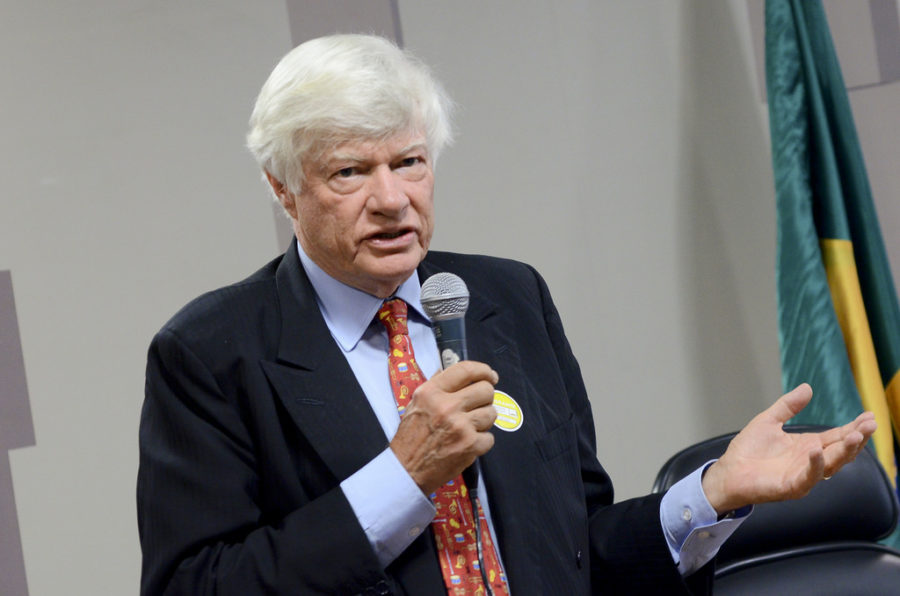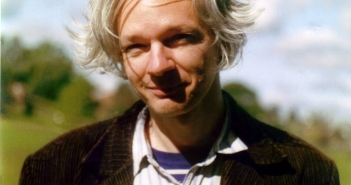In his autobiography– in itself an unusual exercise for a lawyer – Geoffrey Robertson QC, refers to himself as a ‘Baby Boomer’, and devotes a chapter to that generation. Although of Generation X myself, we share similar career trajectories in our commitment to human rights, which is probably why Geoffrey kindly sent me this biography, Rather His Own Man, for review.
The title is revealing on all sorts of levels. First, there is no doubt that he has ploughed a creative and perhaps lonely furrow on legal and societal issues, enhancing the cause of human rights in the UK, and throughout the planet. Compared to other Baby Boomers his contribution has been largely positive, which could not be said for his birthfellow Mr Clinton.
Secondly, though every inch a hard-working scholarship boy from an ordinary school in Sydney, it may be argued that the opportunities he was afforded, notwithstanding his obvious dynamism and drive, were not commonly allocated to Generation X. With fewer aspirants in the 1960s it was easier to forge the path of an international human rights lawyer. He might concede that to achieve his level of dominance and fame would be impossible now for anyone starting from a lower rung on the social ladder. More to the point, the cause of human rights, something I will return to, is dying. Thirdly, and I think most importantly, in the present age – more so than ever – remaining your own man or woman is increasingly difficult, or even nigh on impossible.
At one level the autobiography is a unique insight into a fading life experience of a somewhat gilded age. He is, as he intimates several times, at the end of the Biblical cycle of ‘three score year and ten.’ The death of his parents at the end of the book are engendering in a personality – one suspects of huge warmth and decency – intimations of mortality. The dying of the light.
As the great chronicler of our age, and perhaps the foremost Baby Boomer Bob Dylan put it ‘It is not dark yet but it is getting there.’[i]
There are many aspects of his upbringing which startled me in the realisation that they were similar to my own. We are both bibliophiles, with a love of the great works of literature. Omnivorous in that respect. The first few chapters of the autobiography offer an immersion into the great fictional and non-fiction books he has absorbed. This very defined liberal arts background is no longer typical of lawyers, but is surely crucial to his eminence.
Elsewhere among his corpus of works there is strict legalism, such as his textbook on Media Law, but he has also put the whole justice structure under a microscope, and has placed law in a sociological and philosophical and indeed historical context.
He epitomises the paper-giving public intellectual practitioner, which are increasingly being replaced by robotic technocrats. To speak and write as mellifously, and occasionally orotundly, as he does might invites caricature and ridicule among the dominant philistinism of today.
He is a non-conformist in the best sense and has represented far from popular people. In this respect, Alberto Moravio’s novel The Conformist (Secker and Warburg 1952) shows how the bureaucratic conformity evident in many lawyers leads to the endorsement of fascism. As a cosmopolitan London QC, something one senses he is hugely proud of, he had the protection and freedom to remain a non-conformist, immune from parochial pressures. He flew the coop and in hindsight is quite prescient about how scholarship decisions, which reading between the lines were marginally in his favour. Expatriation gave him a distance from, and perspective on, his native land; about which he writes with a tint of nostalgia and doe-eyed remembrance, in common with Irish Americans recall of their ‘old country’.
It should be stressed it cannot have been easy to ascend to his level even in more informal times. He tells an interesting anecdote of his first appearance at Knightsbridge Crown Court, representing an indecent t-shirt seller, where his ‘irritable vowels’ of Australian slang lead a snobbish judge to rebuke him. The t-shirt my lord he intoned ‘Says Fuck art, let’s dance.’ To which the judge responded with a reference to his Australian inheritance you surely meant to say: ‘Fuck at, lets drance.’
Elements of the English establishment may have embraced him but one senses he is still a quintessential outsider.
As an aside, just as Geoffrey Robertson aspired in his childhood to appear before the Old Bailey so did I, managing to do so very recently. I recall saying in front of my peers when I was sixteen precisely what he had: ‘I want to be a barrister at the Old Bailey in England’, and being greeted with the same jeering laughter and bemusement.
Now I doubt suburban Sydney is as bad as suburban Ireland in its contempt for that particular courthouse, but I recognise that he had many barriers of prejudice to surmount. It should be stressed that his affectionate evocations of the Australian bar are quite different from my view of the Irish bar.
He makes the point several times and he is absolutely right, that all true change comes from troublemakers, dissenters and muckrakers and that the bland technocratic and compliant conformity of our new world order needs to be resisted.
Yet the vanity, though not in a bad way, of the narrative is quite breathtaking. It is almost like reading Katherine Hepburn’s autobiography, simply entitled Me (Knopf 1991), as if everybody should know who that is. Well of course they do, and there is nothing wrong with subjectivism, or an element of personal vanity as long as it leads to the whole series of achievements and good deeds he has accomplished.
One is dumbstruck at the litany of the high profile representations, and wonders how he has done it. Not least physically. Leaving aside enormous ability, other aspect of his personality emerge, which might be open to censure. He is a total social butterfly and name dropper, and his friends and associates are all glittering examples of the chattering classes, as are many of his amours. Now I would imagine this pronounced maven-like networking ability is a huge asset and he has effortlessly glided between different worlds in the cosmopolis. Is he a lawyer? Is he a public intellectual? Is he a media don? Is he just another part of the culture of solipsism and celebrity?
I do not mean to be dismissive and am not. That maven-like ability and his ability to interact at different cultural levels, I suspect, is why he has achieved as much as he has done. Like all great advocates he is an everyman, and complex creature. But to be this unclassifiable is now no longer, in my view, an asset, but a liability. The lawyering caste, and the world at large, is now populated by arcane specialist, not generalists, however Olympian.
Robertson is clearly the thinking woman’s lawyer. The alpha-male-minus of the Baby Boomer generation. Man, the very man, but not a caveman. A feminist success. He is very critical, as am I, of corporate lawyers and the vast wealth they accumulate doing no good at all. I think he is very proud in hindsight that he has fulfilled his potential and has been a conventional success by pursuing a less than conventional path.
There are little clues though to the alpha-male-minus that I must say I do not like. He sees nothing wrong with academic Stalinists no platforming people. But I do. His fellow Baby Boomer and Australian Germaine Greer was no platformed for saying that a man who becomes a woman can never truly understand what it is like to be one. He is rightly indignant, as am I, about Catholicism and how its institutions have covered up child abuse, and in fact wrote a beautiful crisp book on that theme called The Case Of The Pope (Penguin, 2010). What he neglects to deal with is that now in Ireland this specialist knowledge base on child abuse has been used by a corrupt state to make false accusations and frame people. Thus the sins of the clergy are recast to target those who dissent and challenge the cosy consensus, led by lawyers often religious in orientation.
I attended a CPD session run by his chambers. Most professional it was, but one was not oblivious to the anti-corporate corporatisation. The slick presentations, the office marketeers and managers. Doughty Street Chambers is in many respects a factory for the good, and he presides over it all like a latter day Friedrich Engels. And he is very proprietorial. At times the CPD was so slick I wanted to holler. But that is too trite a judgment and perhaps reveals my own parochialism. Doughty Street Chambers, of which he is rightly enormously proud, is a totemic achievement and he presumably knows in this age of advertising and soundbites that in order to take on corporatisation one has to adopt their methods, or at least know a bit about branding. Robertson has been brilliant at marketing himself and his product.
I applaud him for this, but I doubt the backbiting Australian legal community are quite so approving. From reading this book I do not think he is anything other than a deeply humane man with an acute and developmental sense of justice, along with a terrific eye for detail, nuance and erudition. He is very prescriptive that a lawyer needs to know the hard data, know his onions before grappling with the ethereal world of human rights. Hard Graft. Sydney scholarship boys grow up harder, and are less tolerant of those that have had it handed to them on plate.
He is very interesting on the nature versus nurture question, having been been given opportunities to grow and develop, thereby escaping the shackles of his background. He has not blown these chances. By contrast, by and large Generation X has had to make more sacrifices and often settle for less. Much less.
He writes with great precision about the secular religion that is human rights as an ethic for our time, but it sounds like the lilt of a dying generation, or generation a their song. It is fin de siècle and the new zeitgeist, which I imagine troubles him, as much as me, is resurgent fascism, the decline of pluralism and multi-cultural tolerance, along with the utilisation of surveillance, which he eloquently conveys in his analysis of his client Julian Assange, under an increasingly oppressive state. Human rights lawyers are the new subversives, as defined by state criminals. The dangerous rise of what Chomsky captured as a triage of evil: postmodernist relativism, neo-liberalism and religious fundamentalism; our post-truth universe, so alien to the truth-telling barrister.
He does mention the word postmodernism favourably once, and such intellectual artifices have probably influenced him unduly, as indeed has an overly-attuned political correctness, but he has had to, and done so brilliantly, navigate some choppy waters.
He defines himself as a Gladstonian Liberal and a Cromwellian Puritan. I am with him on the former, but not the latter. Puritanism far too easily morphs into Brahmin self-righteousness. Also, dare I say, to define oneself in such sonorous terms, is an echo of a different age. Based on his positive ambivalence towards Lord Denning and enthusiasm for U.S. Legal realism as well as the Harvard Socratic method he seems to be a pragmatist, like myself. Castles in the sky, I would imagine, he has always resisted.
The most interesting part I found was his analysis (pp. 446-447) of the ‘banality of evil’ – to appropriate Hannah Arendt’s phrase – among government, judicial and state officials, which I witnessed in Ireland. Bean counters absolve themselves of responsibility for evil deed by claiming they had to feed their families. Evil is incremental and increasingly apparent in our times.
Just as Eichmann saw himself as only putting people on trains, and a mere functionary in Hannah Arendt’s description, so austerity cost-cutters render a decent existence for many people a huge struggle, if not an impossibility.
I think Robertson accepts he – and I hope he does not take offense – is now a banger, a cab rank tart and a gun for hire, even for the right reasons. I doubt he has ever considered himself anything else and there is underlying the ego a deep-seated modesty, and acceptance indeed, of the absurdity of the human condition.
He is prescient about knowing when enough is enough. Experience and judgement are all assets, but not if mind and body are failing.
It is a remarkable life, and for a lawyer almost unique. He is also still fresh and childlike and a real force for good. In this day and age that is a huge achievement.
To revert briefly to Irish, or Australian, begrudgery, it just shows how far you can go with the gift of the gab. But the light is dying for the good. It as if we have stepped into Jean Renoir’s 1939 film La Regle De Jeu, on the precipice of an environmental and economic collapse that collectively we are sleep walking into. Robertson has stood bravely resisting the subversive tide. But the tide is high, and what can this King Canute or Rumpole of the legal profession do apart from
Rage, rage, rage against the dying of the light. (Dylan Thomas: ‘Let us Not Go Darkly Into That Night’ (1952)).
Did you know that Cassandra Voices has just published a print annual containing our best articles, stories, poems and photography from 2018? It’s a big book! To find out where you can purchase it, or order it, email [email protected]
[i] (Dylan: Not Dark Yet from Time Out of Mind (Columbia 1997).




